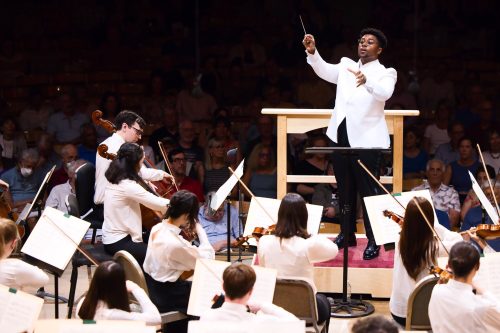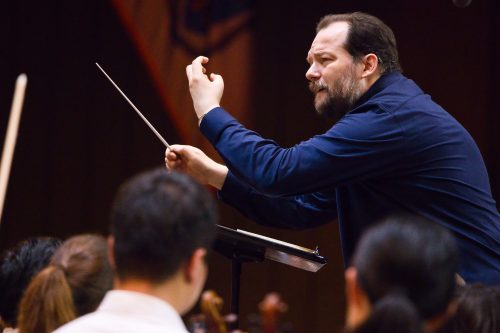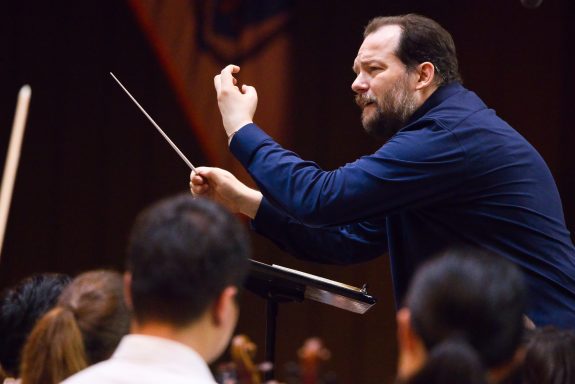 United States Tanglewood Festival 2024 [2] – Dvořák, Coleridge-Taylor and Shostakovich: Tanglewood Music Center Orchestra / Ross Jamie Collins, Na’zir McFadden, Andris Nelsons (conductors). Koussevitsky Music Shed. Lenox, 8.7.2024. (CSa)
United States Tanglewood Festival 2024 [2] – Dvořák, Coleridge-Taylor and Shostakovich: Tanglewood Music Center Orchestra / Ross Jamie Collins, Na’zir McFadden, Andris Nelsons (conductors). Koussevitsky Music Shed. Lenox, 8.7.2024. (CSa)

Dvořák – Carnival Overture, Op.92 (conductor: Ross Jamie Collins)
Coleridge-Taylor – Ballade in A minor, Op.33 (conductor Na’zir McFadden)
Shostakovich – Symphony No.5 in D, Op 47 (conductor Andris Nelsons)
Set deep in the wooded Berkshire hills of Western Massachusetts, the historic eighteenth-century town of Lenox plays host to the Tanglewood Music Festival. Every July and August the Boston Symphony Orchestra, under its resident conductor Andris Nelsons, emigrates here for two months of intense music making. Tanglewood also serves as a highly competitive summer training academy for emerging professional instrumentalists, singers and conductors – Tanglewood Music Center Fellows – who are closely mentored by the Boston players and visiting artists. While BSO concerts make up the body of the season’s programming, its beating heart is the Tanglewood Music Center Orchestra. Here these talented students perform at the highest level.
Two vibrantly joyous works – Dvořák ‘s Carnival Overture and Samuel Coleridge-Taylor’s Ballade in A minor – made up the first half of the TMCO’s opening concert which after the interval were followed by Shostakovich’s complex, emotional roller coaster of a symphony, No.5 in D. In each the players were led by a different conductor.
The 22-year-old Finnish British Ross Jamie Collins is a former pupil of Klaus Mälkelä and one of this year’s Tanglewood’s Music Center Conducting Fellows. He dominated the podium in the opening Carnival. The precision and expressiveness of his elaborate direction brought exuberance and intensely bright orchestral colour from these young musicians. The dancing rhythmic opening fairly bustled with the noisy crowds, street vendors and hawkers of Dvořák’s imagination. While there were moments of sectional imbalance and volume control, particularly in the brass, they might well have been attributable to the acoustical challenges of the Koussevitsky Shed, and certainly did nothing to dim the pleasures of a Bohemian fiesta in full swing.
Coleridge-Taylor was born in London to a Sierra Leonese father and white English mother. He was composing in the early twentieth century and was often compared to Mahler. He was also heavily influenced by Dvořák. In 1898, 14 years before his untimely death, he composed his Ballade in A minor, which, despite the absence of a musical narrative, is in form and substance a tone poem. From the introductory dramatic role of the timpani and blazing brass and woodwind in the opening section to the tender, almost filmic theme that follows, the playing, under the immaculately wielded baton of Na’Zir McFadden burst with youthful effervescence, and energy.

After the interval, the orchestra was joined by maestro Andris Nelsons in a deeply moving account of the Shostakovich. After the Soviet regime’s denigration of his publicly acclaimed opera, Lady Macbeth of the Mtsensk District, it is said that Shostakovich was summoned by one of Stalin’s emissaries and asked whether he accepted the official rebuke. Balancing musical integrity with the need to protect himself from cultural banishment or worse, the composer – tongue firmly in cheek – obsequiously inscribed his symphonic response ‘a Soviet artist’s creative reply to just criticism’. In a game of political cat and mouse, the mouse came out on top. The resulting work, heroic and tragic in equal measure, was a masterpiece which cunningly defied the authorities.
Nelsons is a Latvian by birth who grew up Riga when the country was in the pale of the USSR. His readings and recordings of Shostakovich symphonies are legendary, and he brought to this performance an innate cultural and historic understanding. An economic yet highly communicative conductor with an unerringly precise beat, Nelsons can change the dynamics and character of a phrase with a minimal gesture of the hand or a raised eyebrow. Under his close supervision his young charges seemed suddenly to acquire a maturity and finesse which belied their years. Biting strings ripped through the opening bars of the Moderato followed by a slow, luxuriant, almost ethereal second subject. Then, with the flick of his wrist, Nelsons racked up the tension with a terrifying, remorseless march, heralded by braying horns and brash trumpets. The second movement Allegretto was a delightfully clumsy and colourful peasant ländler with fine contributions from the winds – notably quartets of insistent oboes and clarinets and a trio of pungently woody bassoons, and an exquisite exchange between the first violin (Katia Tesarczyk) and principal flute (Elizabeth McCormack). This was followed by a Largo – a poignant lament – in which pianissimo strings hovered in the air with heart stopping delicacy. Red hot excitement characterised the final Allegro non troppo. Here, the gradual buildup of brass and percussion culminated in a bellicose militaristic coda, a final musical moment in which the dissident Shostakovich thumbed his nose at the uncomprehending authorities. In a masterfully nuanced and tightly coordinated performance of this great work, the 2024 TMCO Fellows truly came of age.
Chris Sallon
